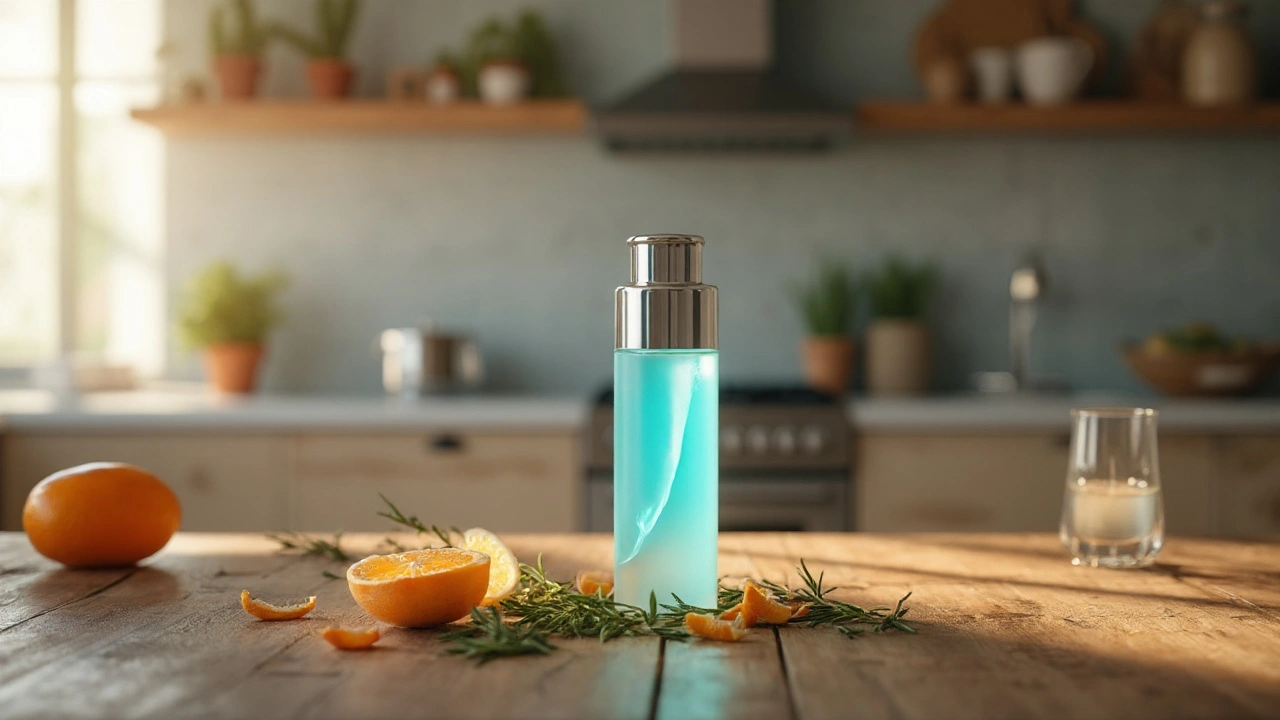
TL;DR
- Renalka is an over‑the‑counter supplement designed to support kidney health and help dissolve small stones.
- Typical adult dose: 2-3 tablets daily with meals, split into two administrations.
- Common side effects are mild gastrointestinal upset; serious reactions are rare.
- Not for pregnant women, people with severe kidney disease, or those taking potassium‑sparing diuretics.
- Talk to a pharmacist or GP before starting if you have any chronic condition.
What is Renalka?
Renalka is marketed as a natural kidney‑support formula. The product combines citric acid, magnesium, and a blend of herbal extracts that aim to increase urine flow and slightly acidify the urinary tract. The idea is to create an environment where calcium‑based stones have a harder time forming, while existing tiny crystals can break down faster.
The brand positions itself as a safe, non‑prescription alternative for people who experience occasional kidney‑stone pain or want to keep their urinary system running smoothly. In the UK, it’s sold in pharmacies, health‑food shops and online stores, and it does not require a doctor’s prescription.
How Renalka Works: The Science Behind the Claim
Renalka’s formulation leans on three core mechanisms:
- Increased urine output: Magnesium citrate is a well‑known osmotic diuretic. By pulling water into the kidneys, it helps flush out salts and small crystals.
- pH modulation: Citric acid and certain herbal extracts mildly acidify the urine. A lower pH can prevent calcium oxalate crystals from aggregating.
- Crystal inhibition: Herbal ingredients such as dandelion leaf and horsetail contain flavonoids that interfere with crystal growth.
Clinical evidence for each ingredient exists, but the specific synergy claimed by Renalka has not been tested in large, double‑blind trials. That doesn’t mean it won’t help; it just means you should manage expectations and combine it with proper hydration.
Proper Dosage & How to Take Renalka
Below is the standard dosage schedule recommended by the manufacturer for adults. Children under 12 should not use Renalka unless a healthcare professional specifically advises it.
| Age Group | Daily Dose | Administration | Notes |
|---|---|---|---|
| 18-65 years | 2‑3 tablets | Divide into two doses (morning & evening) with meals | Take with at least 250ml water each time |
| 65+ years | 2 tablets | Morning and evening, with meals | Check kidney function with GP before starting |
| Pregnant / Breastfeeding | Not recommended | - | Consult a doctor for alternatives |
Key tips for getting the most out of Renalka:
- Drink at least 2litres of water a day. The supplement works best when you stay well‑hydrated.
- Do not crush or chew the tablets - swallow them whole.
- If you miss a dose, take it as soon as you remember, unless it’s close to the next scheduled dose. In that case, skip the missed one and resume the regular schedule.

Benefits, Potential Side Effects & Safety Considerations
People who take Renalka often report two main benefits: less frequent flank pain and clearer urine. Because the product is not a medication, it does not replace prescription stone‑prevention drugs when those are needed.
Common, usually mild side effects include:
- Stomach cramping
- Loose stools or mild diarrhea
- Transient metallic taste
Serious reactions are rare but can happen, especially if you have:
- Severe chronic kidney disease (eGFR<30ml/min/1.73m²)
- Hypermagnesemia
- Allergy to any herbal component
When a serious reaction occurs, symptoms might include chest pain, rapid heartbeat, or severe abdominal pain. Stop taking Renalka immediately and seek medical help.
Additional safety notes:
- Renalka contains magnesium; if you’re already on magnesium supplements, you could exceed safe levels.
- People taking potassium‑sparing diuretics (e.g., spironolactone) should be cautious because the formula can shift electrolyte balance.
- Always store the product in a cool, dry place, away from direct sunlight.
Frequently Asked Questions About Renalka
Below are the questions most people type into search engines after reading a product label.
- Can Renalka cure existing kidney stones? It may help break down very small stones (under 3mm) but it won’t dissolve larger ones. Imaging is required to know the size.
- How long should I use Renalka? Many users take it for a 4‑ to 6‑week cycle, then pause for a month. Long‑term continuous use isn’t backed by research.
- Is Renalka safe for diabetics? The product does not contain sugar, but some herbal extracts can affect blood glucose. Monitor levels closely and discuss with your doctor.
- Can I take Renalka with my prescription stone medication? Generally yes, but only under medical supervision to avoid duplicated ingredients.
- What should I do if I miss a dose? Take it as soon as you remember unless it’s within two hours of the next dose. In that case, just skip the missed one.
Next Steps: How to Decide If Renalka Is Right for You
Start by checking your personal health profile. If you’ve had a kidney‑stone episode in the past year, have mild symptoms, and no severe kidney impairment, Renalka can be a low‑risk addition to a hydration‑focused routine.
Schedule a quick chat with your pharmacist. Bring the supplement label so they can spot any possible interactions with your current meds.
If you’re pregnant, nursing, or have chronic kidney disease, look for alternative ways to boost urine flow - for example, a higher water intake, dietary tweaks (reduce oxalate‑rich foods), or a doctor‑prescribed citrate supplement.
Finally, keep a simple log for the first two weeks: note the dose you took, how much water you drank, and any symptoms. This log helps you and your healthcare provider see whether the supplement is making a difference.

11 Comments
Thank you for sharing this comprehensive guide; staying hydrated and supporting kidney health is essential, especially for those prone to occasional stone formation. I recommend pairing Renalka with a daily water intake of at least two liters, as the supplement works best when the urinary system is well‑flushed.
Wow, this looks like a solid option for anyone looking to boost urine flow naturally! The magnesium citrate really does the heavy lifting as an osmotic diuretic, and the herbal extracts add that extra protective layer.
i think its cool that they use dandelion leaf and horsetail, those herbs are pretty common in home remedies. just a heads up, some ppl get a little tummy ache if they overdo the dose, so stick to the recommendation.
From the moment I first read about Renalda I felt a surge of patriotic pride in the ingenuity of our domestic manufacturers.
Our great nation has always championed self‑reliance, and a supplement that promises to keep our kidneys humming without a prescription fits that narrative perfectly.
The blend of citric acid, magnesium, and herbal extracts is a testament to centuries‑old folk wisdom that modern science finally acknowledges.
Indeed, the push for natural alternatives reflects a courageous break from the over‑reliance on synthetic pharmaceuticals that dominate the market.
While the FDA may not have granted it the prestigious badge of a clinical trial, the very fact that it can be purchased over the counter empowers every citizen.
Our ancestors would have cheered the very idea of a simple tablet that boosts urine flow and combats stone formation.
Consider the economic impact: fewer doctor visits, lower prescription costs, and a healthier workforce that fuels our national productivity.
Moreover, the product’s availability in local pharmacies underscores the commitment of our retailers to community health.
Even if the evidence base remains modest, the principle of hydration coupled with a modest diuretic effect aligns with time‑tested preventive strategies.
Critics who demand double‑blind trials often forget that everyday health decisions are made on the balance of risk and benefit.
By encouraging people to stay well‑hydrated and take a modest supplement, we foster a culture of proactive wellness.
The side‑effects listed-mild gastrointestinal upset-are trivial compared to the agony of a kidney stone episode.
Patriotic citizens should support homegrown solutions that reduce dependence on imported pharmaceuticals.
Let us celebrate Renalda as a beacon of accessible health innovation that proudly bears the flag of our industrious nation.
In the grand tapestry of public health, such modest interventions are the threads that keep the fabric strong.
the product sounds like another marketing gimmick it pushes a pseudo‑science narrative with barely any real data it’s just a cheap way to cash in on people’s fear of kidney stones
Hey everyone, just a gentle reminder that supplements like Renalka work best when you combine them with lifestyle changes – regular exercise, balanced diet, and of course, plenty of water. If you have any doubts, a quick chat with a local pharmacist can clear up a lot of the confusion.
Take the recommended dose, stay hydrated, and monitor any gastrointestinal discomfort; if symptoms persist, stop and consult a physician.
Looks promising! 😊
In the UK we’ve seen a rise in kidney‑stone cases, and accessible products like this could help reduce pressure on NHS services if used responsibly.
From an ethical standpoint, promoting over‑the‑counter remedies without rigorous RCT validation borders on negligent medical paternalism; we must champion evidence‑based interventions over commercial hype.
While the enthusiasm is palpable, it’s worth noting that reliance on a single supplement may give users a false sense of security; a balanced approach that includes diet modification and professional oversight remains paramount.